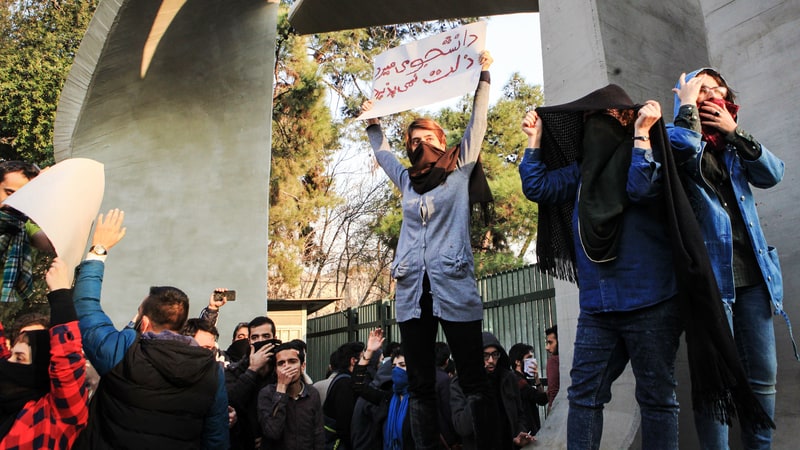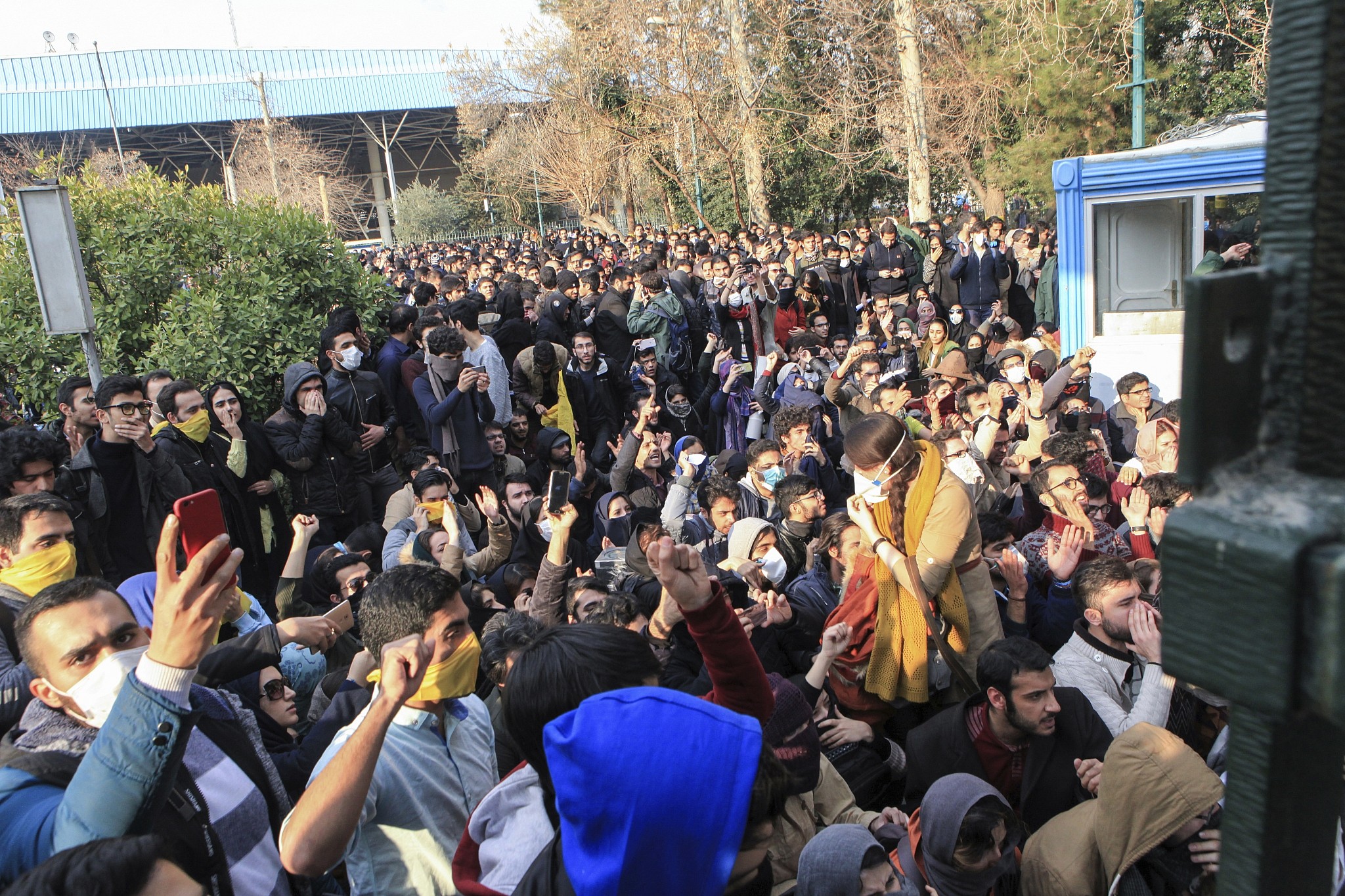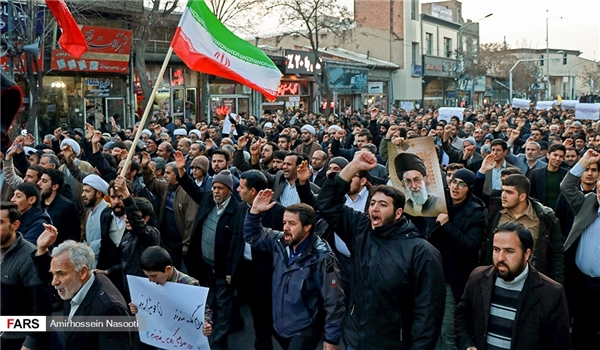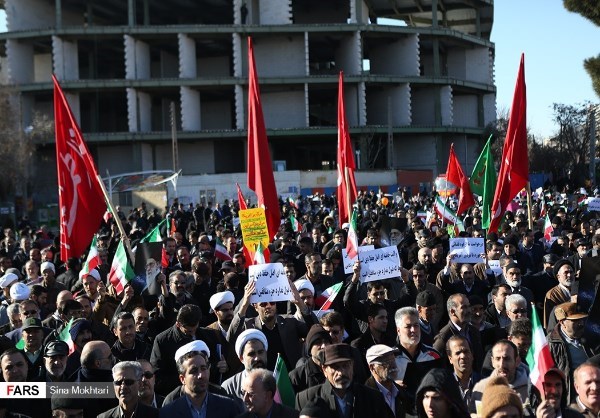www.aljazeerah.info
News, January 2018
Archives
Mission & Name
Conflict Terminology
Editorials
Gaza Holocaust
Gulf War
Isdood
Islam
News
News Photos
Opinion Editorials
US Foreign Policy (Dr. El-Najjar's Articles)
www.aljazeerah.info
|
Editorial Note: The following news reports are summaries from original sources. They may also include corrections of Arabic names and political terminology. Comments are in parentheses. |
Pro-Government Rallies and Revolutionary Guard Counter Iranian Protests
January 3, 2018
 |
 |
| Iranian students protesting at the University of Tehran, December 30, 2017 | Iranian students protesting at the University of Tehran, December 30, 2017 |
 |
 |
| Pro-Iranian government rally, January 3, 2018 | Pro-Iranian government rally, January 3, 2018 |
Iranians Rally to Condemn Recent Riots
January 3, 2018, Fars
TEHRAN (FNA)-
Hundreds of thousands of Iranian people in different cities and towns poured to the streets on Wednesday morning to condemn the recent riots and chaos in the country and show support for the Islamic Revolution.
People across the country, including Khuzestan, Qom, Kermanshah, Ilam, Gilan, Alborz, Lorestan, North Khorassan, Golestan and Hamedan provinces, gathered in important squares and streets of their cities and towns to show unity and deplore hijack of the recent economic protests in Iran by rioters in the country.
They chanted "Death to the US", "Death to Israel" and "Death to the Seditionist" slogans to condemn US President Donald Trump and Israeli Prime Minister Benjamin Netanyahu's support for the recent riots in Iran.
They also carried placards which called on the government to pay attention to the legal demands of the people to improve life standards, create more jobs and decrease inflation.
Economic protests in a number of Iranian towns in the past few days have turned into riots each comprised of a few hundred protesters.
Supreme Leader of the Islamic Revolution Seyed Ali Khamenei warned that on Tuesday that the enemies have mobilized all their power and tools to hit a blow at Iran, alluding to certain foreign states' role in the recent riots in the country.
"The enemy has always been waiting for an opportunity and a breach to enter and hit a blow to the Iranian nation," Ayatollah Khamenei said, addressing the families of the Iranian martyrs in Tehran.
"During the events in the past few days, the enemies of Iran allied to create problem for the Islamic Republic by different tools in their hands, including money, weapons, policy and security organizations," he added.
Ayatollah Khamenei said that the nation's spirit of bravery, sacrifice and faith blocks the enemy and its hostilities, adding that he will speak with people about the recent protests and unrests in Iran in due time.
Also on Tuesday, Deputy Commander of the Islamic Revolution Guards Corps (IRGC) for Political Affairs Brigadier General Rasoul Sanayee took responsible the US, Saudi Arabia, the monarchists and Mojahedin-e Khalq Organization (MKO, also known as the MEK, PMOI and NCRI) terrorist group for the recent violent riots in a number of Iranian cities and towns.
"Today, we are witnessing that the anti-revolutionaries, the monarchists, Monafeqin (hypocrites as MKO members are called in Iran), the US and al-Saud as well as a grouplet led by a fugitive clown are misusing the social and economic protests of our country's people and have turned them into riots and sabotage acts," General Sanayee Raad said.
"The slogans chanted in the past two or three days by the rioters clearly showed that Manafeqin and the monarchists are behind this story," he added.
Iranian President Hassan Rouhani on Monday lashed out at certain countries, specially Saudi Arabia, for their attempts to foment unrests in Iran, and promised the nation to accelerate efforts to resolve the economic problems.
Addressing chairpersons of the Iranian parliament's different commissions in Tehran, President Rouhani said that the enemies are angry with Iran's different successes and achievements, including the 2015 nuclear deal, effective fight against terrorist groups and expansion of ties with different world states.
"These have angered our enemy. Our unity was a bullet (arrow) in their eyes and our progress and success in the world of politics and against the US and the Zionist regime was not bearable to them. Our success in the region was not bearable to them," he said.
"They (the Saudis) have blatantly said that we will create problems in Tehran," Rouhani said.
He also vowed that his government will double efforts to resolve the country's economic problems, unemployment, air pollution and inflation.
His remarks alluded to Saudi Arabia’s then deputy crown prince who said in an interview last year that dialogue between his nation and Iran is impossible because of what he called as the latter’s “extremist ideology".
Mohammed bin Salman, the Saudi Crown prince, who served as Riyadh’s defense minister and second in line to the throne at the time, claimed that his country is a primary target for Iran and charged that Iran sought to control of the Islamic world. “We won’t wait for the battle to be in Saudi Arabia,” Prince Mohammed said, “instead, we’ll work so that the battle is for them in Iran.”
The mainstream media in the West has given a wide coverage to the economic protests in a number of Iranian towns in the past few days, but none has covered the massive pro-government rallies held in more than 1,200 cities and towns on Saturday.
***
Iran deploys Revolutionary Guards to quell 'sedition' in protest hotbeds
Bozorgmehr Sharafedin
January 3, 2018 / 3:12 AMIran’s elite Revolutionary Guards have deployed forces to three provinces to put down an eruption of anti-government unrest, their commander said on Wednesday, after six days of protests that have left 21 people dead.
Thousands of Iranians took part in pro-government rallies in several cities on Wednesday in a state-sponsored show of force aimed at countering unrest posing the most sustained challenge to the Islamic Republic’s clerical elite in almost a decade.
State television broadcast live pictures of rallies in the southwestern cities of Kermanshah and Ilam and in the northern city of Gorgan, where marchers waved Iranian flags and pictures of Supreme Leader Ayatollah Ali Khamenei.
But, in a sign of official concern about the resilience of the protests, the Revolutionary Guards commander, Major General Mohammad Ali Jafari, said he had dispatched forces to Isfahan, Lorestan and Hamadan provinces to tackle “the new sedition”.
Most of the casualties among protesters have occurred in those regions. The Revolutionary Guards, the sword and shield of Iran’s Shi‘ite theocracy, were instrumental in suppressing the 2009 uprising, killing dozens of protesters then.
In the Shi‘ite holy city Qom, pro-government demonstrators chanted “death to American mercenaries”. There were similar rallies in Isfahan, Iran’s third largest city, and Abadan and Khorramshahr in the oil-rich southwest, state TV footage showed.
Marchers chanted, “The blood in our veins is a gift to our leader (Khamenei),” and, “We will not leave our leader alone.” They accused the United States, Israel and Britain of inciting protests, shouting “the seditionist rioters should be executed!”
The protests began last week out of frustration over economic hardship among the youth and working class but have evolved into broader unrest against the hardline clerical establishment dominating since the 1979 Islamic Revolution.
RARE ANTI-GOVERNMENT OUTBURST
Political rallies held in defiance of the pervasive security services have called for the overthrow of all Iranian leaders.
The protests, organized on social media, have largely been held after dusk. They continued into Tuesday night with social media videos showing demonstrators on the streets and riot police in several cities including Ahvaz in the southwest.
U.S. President Donald Trump, who has sought to isolate the Tehran leadership, reversing the conciliatory approach of predecessor Barack Obama, said Washington would throw its support behind the protesters at an “appropriate time”.
“Such respect for the people of Iran as they try to take back their corrupt government. You will see great support from the United States at the appropriate time!” Trump wrote in the latest of a series of tweets on Iran’s turmoil.
On Tuesday, Khamenei had accused Iran’s adversaries of fomenting the protests, some of which have criticized him by name and called for him to step down.
An Iranian judicial official said on Wednesday a European citizen was arrested in protests in the Borujerd area of western Iran, but did not specify the nationality of the detainee.
“(This) European citizen ... had been trained by European intelligence services and was leading the rioters,” Hamidreza Abolhassani, head of Borujerd’s Justice Department, was quoted by Tasnim news agency as saying.
In Geneva, the U.N. human rights chief urged Iran to rein in security forces to avoid further violence and respect the right of protesters to freedoms of expression and peaceful assembly.
Zeid Ra‘ad al-Hussein, U.N. High Commissioner for Human Rights, said more than 20 had been killed and hundreds arrested across Iran in the past week. He called for “thorough, independent and impartial investigations of all acts of violence...”
An official in Iran’s hardline judiciary warned that some of those arrested could face the death penalty.
The outburst of dissent is the most serious since 2009, when Iranians took to the streets over accusations of vote-rigging in the re-election of then-President Mahmoud Ahmadinejad.
The protests have heaped pressure on President Hassan Rouhani, who championed a deal struck with world powers in 2015 to curb Iran’s disputed nuclear program in return for the lifting of most international sanctions against Tehran.
Many of the protesters are fuming over what they see as the failure so far of his government to deliver on promises of more jobs and investment as a payoff from the nuclear accord.
Rouhani, who has said Iranians have a right to protest peacefully, told Turkish President Tayyip Erdogan in a phone call on Wednesday he hoped the unrest would end in a few days.
“We are certain about Iran’s security and stability ... People are free in Iran to protest within the framework of law,” Rouhani was quoted as saying by the state news agency IRNA.
TOUGH CHOICE ON SANCTIONS
Trump has said in tweets that Iranians have lost patience with alleged graft and what he called a terrorist regime.
Trump must decide by mid-January whether to continue waiving U.S. sanctions on Iran’s oil exports under the terms of the nuclear deal that he opposed.
But, given that the unrest began over high unemployment and prices, if he reimposes sanctions on oil it could increase the economic pain for Iran’s people, analysts say.
“If the Americans’ sympathy with Iranians were real, they would have not imposed cruel sanctions on the our nation,” Jafari, the Revolutionary Guards commander, said on Wednesday.
Referring to Rouhani’s policy of detente with the West, Jafari told Fars news agency that “friendship with the United States” would never bring prosperity and that the Guards were ready to help the government overcome economic challenges.
ECONOMIC DOLDRUMS
Resentment over economic stagnation and reputed graft within the clerical and security hierarchies sparked the protests after Iranians took to social media to vent their discontent.
The anger has been building up since last month. Thousands of Iranians joined a hashtag campaign on Twitter and other sites to express frustration over the slow pace of reforms.
Under the “#I am regretful” hashtag, they expressed disappointment with Rouhani, who was elected on promises of tackling high unemployment and granting more social freedoms.
They focused on his latest budget bill. It has allocated, as usual, billions of dollars to religious universities and institutions while the government said it lacks the cash needed to aid the unemployed, including the 28.8 percent of youth who are jobless.
Both the arch-conservative Khamenei and the pragmatist Rouhani have pledged to crack down on high-level corruption and create economic prosperity for all Iranians.
But there have been few changes. The Revolutionary Guards, for example, still control a vast, lucrative economic empire.
While more than 20 million out of 80 million Iranians live below the poverty line, the wealthy, including relatives of government officials, import tens of thousands of luxury cars every year, causing widespread resentment.
While young, impoverished Iranians have dominated the current protests across the Islamic Republic, some members of the urban middle class are also taking part.
In an attempt to control the flow of information and calls for anti-government gatherings, Tehran authorities have restricted access to the Telegram messaging app and Instagram, owned by Facebook Inc FB.O..
Reporting by Bozorgmehr Sharafedin, with; additional reporting by Stephanie Nebehay in Geneva and Doina Chiacu in Washington; editing by Mark Heinrich
***
Share the link of this article with your facebook friendsFair Use Notice
This site contains copyrighted material the
use of which has not always been specifically authorized by the copyright
owner. We are making such material available in our efforts to advance
understanding of environmental, political, human rights, economic,
democracy, scientific, and social justice issues, etc. We believe this
constitutes a 'fair use' of any such copyrighted material as provided for
in section 107 of the US Copyright Law. In accordance with Title 17 U.S.C.
Section 107, the material on this site is
distributed without profit to those
who have expressed a prior interest in receiving the included information
for research and educational purposes. For more information go to: http://www.law.cornell.edu/uscode/17/107.shtml.
If you wish to use copyrighted material from this site for purposes of
your own that go beyond 'fair use', you must obtain permission from the
copyright owner.
|
|
|
|
||
|
||||||


